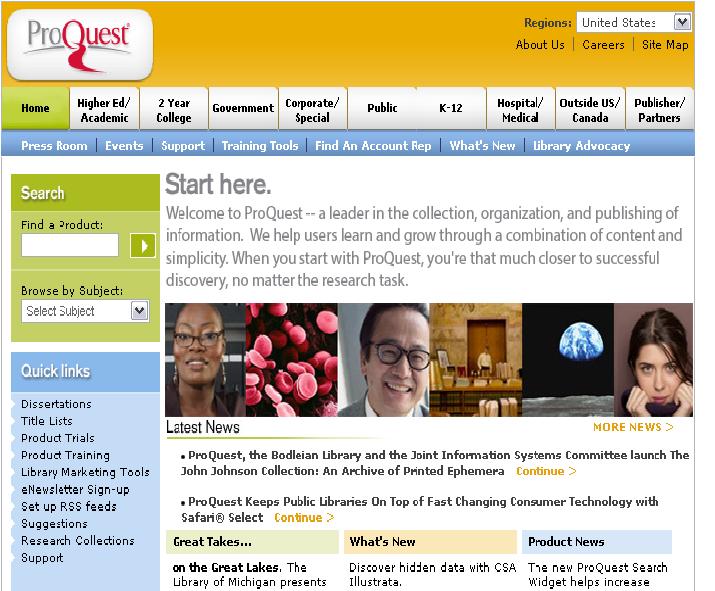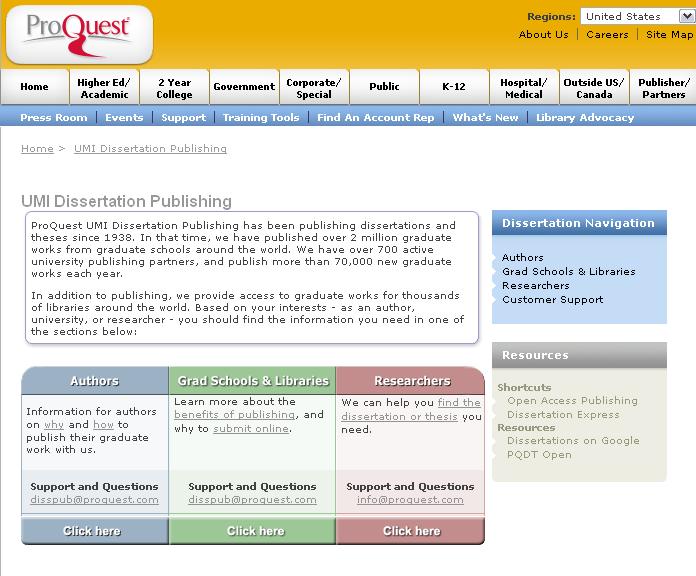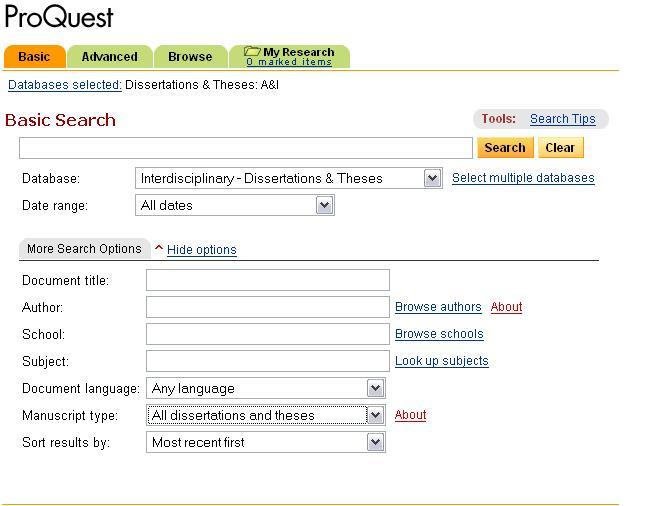
| |
 |
Susan C. Jones
(See email
contacts page for the author's email address.)
The publication of Harrison Eiteljorg's article, "The Electronic Monograph: A Scholarly Necessity or the Never-Reached: Pot of Gold at the End of the Rainbow?" in the last issue of the CSA Newsletter has provoked a number of comments and raised questions about the electronic availability of various forms of academic publications -- peer-reviewed articles, monographs, etc. (See the commentary page for his article at http://csanet.org/newsletter/winter08/04commentary.html to join the discussion.) We here at the CSA offices became curious about one of the most fundamental of such publications, the dissertation. Traditionally in the USA, copies of dissertations have been given to UMI (University Microfilms International) for archiving. UMI, since its founding in 1938, has maintained this archive in microfilm/microfiche format; printed or micro-formatted copies were made available upon request. In 1996, UMI created a web presence in the form of ProQuest Direct. Its descendant, ProQuest, is now one of the major online providers of microfilm/microfiche and digital information to libraries1 and among its many archived resources are over 2,400,000 volumes of dissertations and theses to date. As of the date of this article, UMI has made over 1,900,000 of these available as downloadable PDF files.
There are two different paths to the the ProQuest website -- directly (www.proquest.com) or through a participating library's web site. I accessed ProQuest both ways, using a standard internet connection from the CSA office and using the Rutgers University libraries as the participating library.2 The two paths have different search capabilities and purchasing options.
The direct path through www.proquest.com is more limited both in search capabilities and in available formats. This is ProQuest's home page.

Fig. 1 - The ProQuest Home Page.
The home page provides a menu on the left side with a link to dissertations. On the dissertation page, there are links for "authors", "grad schools and libraries" and "researchers." The "authors" link provides promotional and submission information; "grad schools and libraries" provides promotional information about their services; "researchers" provides promotional information, instructions on how to use ProQuest directly and a link to place direct orders for dissertations/theses. Each page brought up through these links provides an 800 customer-service number. Relevant for this article is the link to the dissertation page, which is shown below.

Fig. 2 - The ProQuest Dissertation Page.
The only searches available through this approach are by ProQuest's internal order number or author/title, but you may submit a free search request through email or an 800 number. You may order a dissertation directly online in an "unbound shrink wrap" format if you know the author or title to identify what you want. Other formats (paperback, hardback, microfilm, and microfiche) are said to be available off-line. I called customer service to find out how to order the PDF version of a dissertation as an individual without library connections. I was told that I could order my own through the department that handled author relationships. I could not order other dissertations in PDF format except through member libraries. Other than to call the author relationships department to verify this, I did not pursue the matter further.3
Access through a participating library, in my case Rutgers, provides a completely different website. This approach has full online search capabilities and the ability to order any format online. Through the convenience of the internet, there is a remote sign-in feature for Rutgers' catalog, so I accessed it while sitting at my desk in the CSA office. Once I logged into the library site, I brought up PDQT, the ProQuest "Dissertation and thesis" database.

Fig. 3 - The Basic Search Form for the
ProQuest Dissertation & Thesis Database
Tabs on this page gave me the choice of a basic search, an advanced search or a browse mode. The fourth tab opens a list of the results from my previous searches in the PQDT. Searches options include:
I tried to search for a few dissertions by keyword and discovered that the search was not terribly sophisticated, nor did it seem to be consistent. If the word(s) used were in the title spelled as input in the criteria, the results included the sought-after dissertation. For example, Ms Sheftel's dissertation, The Ivory, Bone and Shell Objects from Gordion from the Campaigns of 1950 Through 1973, appeared with searches for "ivory" and for "Gordion." If, however, the search word(s) were not the the title, the results were mixed. A search for "furniture" did not find Ms. Sheftel's opus. Similarly, Mr. Eiteljorg's The Greek Architect of the Fourth-century B.C.: Master Craftsman or Master Planner appeared on a search for "Greek and architect," but not on a search for "Propylaia" nor on one for "Propylaea." The search on "Propylaia" found two references, while the search for "Proyplaea" brought up three different ones; none of the five were Mr. Eiteljorg's. Both of these searches, however, did bring up dissertations where "Propylaia" was not in the title under either spelling, e.g., Jari Tapio Pakkanen's Buildings, columns, and blocks: Five studies on ancient Greek architecture. Mr. Eiteljorg suggested that the Arsenal of Philon was more central to his dissertation; a keyword search on "arsenal" did not find his dissertation.
A search on "Athenian" and "Acropolis" brought up only 14 dissertations! Some of these included those words in their titles and some did not. In short, the search mechanism was not even as good as a typical library catalog search where books are listed by Library of Congress classifications.
Once the results of the search appear, you are given the choice of viewing an abstract, viewing the first 24 pages of the dissertation online or ordering a copy. Ordering online involves the usual procedure with a shopping cart, but other ways to place an order (telephone, fax, post) are offered. Price depends upon the format and where the order originated. If you are ordering a PDF through the website of the institute that granted the degree, there is no charge. For all other formats and ordering origins there is a charge.
Rutgers' library catalog system does include its own dissertations in the results of general catalog searches, but no others. The procedure set up to use the ProQuest database is no more difficult than any other interlibrary catalog search.
There is another option available for recent dissertations. UMI, through ProQuest, offers authors the option to publish them as Open Access documents; this gives free internet access to any researcher through subscribing libraries. The intital cost of putting the dissertation online is born by a fee charged to the author, but it is not onerous. 4
The two different access methods provided completely different experiences, both of which were a little frustrating. First the direct approach. As with many large, complex websites, I found the ProQuest's home page hard to navigate. Many of the pages promoted their products or offered advice on what to do but were dead-ends when it actually came to performing the required actions. For the independent scholar, the website really only offered an ordering system. It provides the internal order number for a dissertation when she provides either the author's name or the dissertation title, and allows her to order a paper copy of it.
Next the approach through a participating library. The procedure for searching the database was straight-forward and easy to understand. The results, however, were bafflingly incomplete. Finding relevant dissertations has never been an easy research task, and, ultimately, Proquest's database provides little benfit over the traditional card-based system. Scholars still need to come to the system knowing that specific schools, authors, etc. might have produced relevant documents. Cataloging archived information so that it can reliably be found is always a formible task. It may just be the case that creating and maintaining a completely satisfactory digital database of almost 2,000,000 records is impossible. Whether it is an impossible task or not, this database has not succeeded in that regard.
-- Susan C. Jones
1. ProQuest supplies not only university libraries, but also and public libraries in the US and other institutional ones. As an aside, it also proves an online database of government documents and archives of newspapers like the NY Times. www.proquest.com/brand/umi.shtml , accessed 4 Apr 08, 2008, no author. Return to text.
2. As each library's web site is organized differently, I will not discuss how to connect to ProQuest through a participating library, just my findings. There are even different pathways to the ProQuest database through Rutgers' online catalog. Return to text.
3. I was told that the only way to order a dissertation other than my own in PDF format was through the system provided by member libraries. There is on the website a method to submit a written request to search the database, so there may be a method to get PDF versions as an unaffliated individual, but it is not easy. None of the customer service people to whom I talked knew of a direct procedure. Return to text.
4. http://www.proquest.com/products_umi/docs/open_access_overview.pdf, accessed 18 Apr. Return to text.
For other Newsletter articles concerning the use of electronic media in the humanities, consult the Subject index.
Next Article: Grey Literature: An Obvious Candidate for Online Access
Table of Contents for the Spring, 2008 issue of the CSA Newsletter (Vol. XXI, no. 1)
 Table of Contents for all CSA Newsletter issues on the Web
Table of Contents for all CSA Newsletter issues on the Web